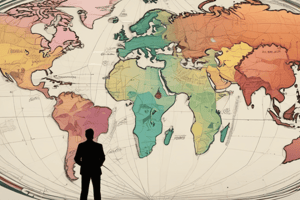Podcast
Questions and Answers
What does ROMI stand for in marketing?
What does ROMI stand for in marketing?
- Return on Money Investment
- Return on Market Investment
- Return on Marketing Investment (correct)
- Revenue on Marketing Initiative
Which of the following is NOT a component of the marketing mix?
Which of the following is NOT a component of the marketing mix?
- Promotion
- Production (correct)
- Price
- Place
What is the primary focus of the marketing concept?
What is the primary focus of the marketing concept?
- Maximizing profits through competitive pricing
- Dominating the market share
- Satisfying customers' wants and needs (correct)
- Increasing sales at any cost
Which phase is NOT part of the business cycle?
Which phase is NOT part of the business cycle?
What does PESTLE analysis identify?
What does PESTLE analysis identify?
Which of the following best describes product adaptation?
Which of the following best describes product adaptation?
What is a key characteristic of protectionism?
What is a key characteristic of protectionism?
What action represents extortion in a business context?
What action represents extortion in a business context?
What is a serious recession referred to in economic terms?
What is a serious recession referred to in economic terms?
Which of the following describes the process of gathering and analyzing information about competitors?
Which of the following describes the process of gathering and analyzing information about competitors?
What type of trade involves exchanging goods instead of using cash?
What type of trade involves exchanging goods instead of using cash?
In which market structure does one supplier control price and supply?
In which market structure does one supplier control price and supply?
Which product decision involves making changes to an existing product for a different market?
Which product decision involves making changes to an existing product for a different market?
What term describes a policy to protect domestic companies by limiting foreign competition?
What term describes a policy to protect domestic companies by limiting foreign competition?
What do import quotas restrict?
What do import quotas restrict?
What is not a characteristic of monopolistic competition?
What is not a characteristic of monopolistic competition?
What characterizes a perfect competition market structure?
What characterizes a perfect competition market structure?
What does consumer ethnocentrism refer to?
What does consumer ethnocentrism refer to?
Which pricing strategy involves setting a single global price for a product?
Which pricing strategy involves setting a single global price for a product?
In product adaptation strategy, what is the firm's approach to foreign markets?
In product adaptation strategy, what is the firm's approach to foreign markets?
What defines a collectivist culture?
What defines a collectivist culture?
What is the main idea behind the 80/20 rule in marketing?
What is the main idea behind the 80/20 rule in marketing?
What are gray market goods?
What are gray market goods?
What distinguishes a differentiated targeting strategy?
What distinguishes a differentiated targeting strategy?
Study Notes
Business Cycle
- The overall pattern of changes or fluctuations in an economy is known as the business cycle.
- The business cycle has four phases: Prosperity, Recession, Recovery, and Depression.
- A depression is a serious recession.
Competitive Intelligence
- Gathering and analyzing publicly available information about rivals is called competitive intelligence.
International Business
- Export Merchants: Intermediaries used to represent a firm in other countries.
- Licensing Agreements: A firm grants another the right to produce and market its product in a specific country.
- Strategic Alliances: Companies collaborate to pool resources for shared goals.
- Direct Investment: A firm expands internationally through ownership, often acquiring a business in the new country.
Product Decisions in International Marketing
- Straight Extension: The same product is offered in both domestic and foreign markets.
- Product Adaptation: Similar but modified products are offered in foreign markets.
- Product Invention: A new product is developed for foreign markets.
- Backward Invention: A less advanced product is developed for countries with limited infrastructure.
Ethics in International Business
- Ethical Relativism: What is considered ethical in one culture may not be in another.
- Bribery: Offering payment to gain an illegal advantage.
- Extortion: An authority figure demands payment under pressure or threat.
PESTLE Analysis
- A framework for identifying external factors affecting a business:
- Political
- Economic
- Social
- Technological
- Legal
- Environmental
Countertrade
- A type of trade where goods are paid for with other goods instead of cash.
World Bank
- An international institution dedicated to reducing poverty and promoting sustainable development through economic improvements.
Balance of Payments
- A record of a country's trade activity, comparing its exports and imports.
- A negative balance of payments occurs when a country imports more than it exports.
Protectionism
- Government policies designed to favor domestic companies.
Import Quotas
- Limits set by a government on the quantity of specific goods allowed to enter a country.
Embargo
- A complete ban on trade of certain goods, prohibiting them from entering or leaving a country.
Tariffs
- Taxes imposed on imported goods.
Market Structures
- Perfect Competition: Many small sellers offering similar products with no individual influence on price, quality, or supply.
- Monopoly: A single supplier controls the price, quality, and supply of a specific product.
- Oligopoly: A few large sellers hold significant market share, competing in a market with many buyers.
- Monopolistic Competition: Many firms offer differentiated products, aiming to provide unique benefits to consumers.
Demographics
- Statistical measures describing population characteristics, including size, age, gender, ethnicity, income, education, occupation, and family structure.
Cultures
- Collectivist Cultures: Individuals prioritize the goals of their community over personal goals.
- Individualist Cultures: Individuals value personal goals more than community goals.
Consumer Psychology
- Consumer Xenocentrism: Belief that products from other countries are superior to domestic products.
- Consumer Ethnocentrism: Belief that domestic products are superior or that buying foreign products is wrong.
Pricing Strategies
- Ethnocentric Pricing: Setting the same price for a product globally.
- Polycentric Pricing: Local partners determine prices for each market.
- Geocentric Pricing: A global price floor exists, but prices are adjusted based on local conditions in each market.
Marketing Concepts
- Marketing Mix: The combination of Price, Place, Product, and Promotion used to influence customer decisions.
- Marketing Concept: A customer-focused approach that prioritizes satisfying customer wants and needs while achieving company goals.
- Utility: The usefulness or benefit customers receive from a product, its price, its distribution, and its marketing communications.
Marketing Rules and Strategies
- 80/20 Rule: 20% of customers typically account for 80% of sales.
- Differentiated Targeting Strategy: Creating unique offerings tailored to different customer segments and maintaining their distinct identities in the market.
- Free Trade Zones: Designated areas where foreign companies can store goods without paying taxes or customs duties until they enter the market.
- Gray Market Goods: Products manufactured abroad and imported without authorization from the trademark holder.
- Gender-Bending Products: Traditionally gender-specific products adapted for the opposite gender.
Studying That Suits You
Use AI to generate personalized quizzes and flashcards to suit your learning preferences.
Related Documents
Description
Test your knowledge on key concepts in international business and marketing. This quiz covers topics such as the business cycle, competitive intelligence, and product decisions in global markets. Understand strategies like licensing agreements and strategic alliances.




